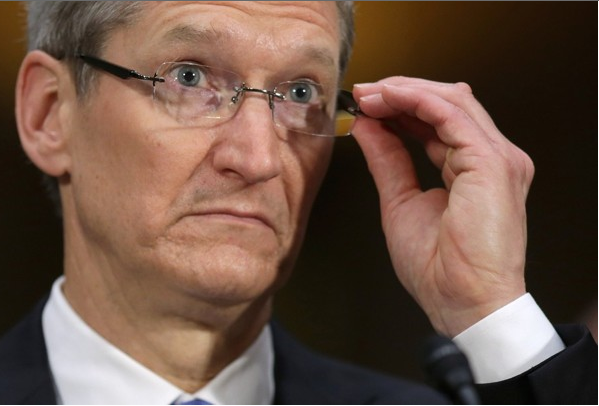
Apple CEO Tim Cook and Chief Financial Officer (CFO) Peter Oppenheimer testified before the Senate Committee at the Apple Tax inquiry this week, and, as usual, politics are at play.
The Apple Tax inquiry issue comes down to three factors: 1) the corporate tax law, 2) the corporate tax loophole, and 3) Apple’s liability (along with other international, American corporations) in the matter. We here at Tapscape want to weed through the transcripts and discussion in order to give you the pertinent facts of the Apple tax inquiry. Ultimately, the decision is yours.

The Law at the Center of the Apple Tax Inquiry
Contents [show]
What is the American Corporate Tax law at play in the Apple tax inquiry? The answer comes from Senator Paul Rand, who, at the hearing praised Apple as a good taxpaying corporation:
“We have a 35% corporate income tax, we’re chasing people away from us…they are obeying the law.”
American corporations are responsible for 35% of their earnings in America to the Federal Government each year. The Apple Corporation, with its headquarters located in Cupertino, California, pays required corporate taxes for all products sold in America. The problem comes in when you realize that the company does not even pay all of its domestic taxes. Tim Cook:
“Apple pays 30.5% of its profits in taxes in the United States.”
This means that the other 4.5% of its domestic taxes are not paid each year. Cook also tried to state during the hearing that Apple pays more than any other American corporation does in domestic taxes. Even so, but Apple’s failure to pay all of its annual taxes is still tax evasion, even if the company did pay the majority of its domestic requirement. If an American citizen gets taxed on 80% of his or her income, and fails to report the other 20%, is he or she not guilty of tax evasion? It is no different with the Apple Corporation or any American business.
The Loophole in the Apple Tax Inquiry
The Apple tax inquiry loophole is that American corporations are only required to pay for good and services sold here. If a corporation goes international, its international sales are not taxable under current corporate tax laws. Tim Cook again:
“Apple is earning these profits outside the US. By law and regulation, these are not taxable in the US. AOI invests that money overseas and then the interest from those investments is taxed in the US.”
The other two Irish subsidiaries, ASI and AOE, are subject to Irish taxes. Apple makes 2% interest on its Irish subsidiaries because of its presence in the country. In other words, some of its foreign money is taxed here, while the majority of its foreign money is not. During the Apple tax inquiry proceedings, Cook said that 2/3 of the company’s profit from the last quarter was placed overseas; however, is it not disproportionate to place 2/3 of your income overseas if two-thirds of your employee base is located here in the US?
Apple is quick to claim that it is a proud, American-based company. Read these words from CEO Tim Cook:
“I am often asked if Apple is still an American company…my answer is an emphatic yes…”
“Virtually all of our R&D and the jobs that go with it, take place in the U.S.”
“We’re an American company. We’re proud to be an American company.”
At the same time, however, the company has the majority of its money overseas. Senator Carl Levin:
“…most of your profits are sitting in three Irish companies that you control that don’t pay taxes. That’s the result…you point out, Mr. Cook, that 95% of the creativity that goes into those products is in California. Two-thirds of those profits are in Ireland. You’ve made a decision not to bring that money home…you’ve made a decision to shift economic value overseas and the result is that most of your profits are not taxed.”
Because those profits are not taxed here, Apple only pays one-third of its total required tax debt each year. Apple paid a mere $900 million in international income taxes last year; when compared to the billions of dollars Apple has sitting in Ireland, what’s $900 million compared to billions earned? Apple pays more in income taxes to the United States — but it only has 1/3 of its total income stored here. Tim Cook could bring back those funds, but will not do so: “I have no current plans to bring those funds back at the current [tax] rates.”
To make matters worse, Senator John McCain accused Cupertino in the Apple tax inquiry of “taking advantage of a system that allows the company to avoid paying $44 billion in income over the past 6 years.”
Liability in the Apple Tax Inquiry
So, is Apple liable for tax evasion in the Apple tax inquiry? Yes and no. The corporate tax loophole allows Apple to avoid taxes with its Irish subsidiaries, while only paying for 35% of its total earnings each year. At the same time, however, it doesn’t add up: Apple is an American-based business, with most of its work done here, and most of its employee base here in the US. Does it seem right that Apple should escape with 65% of its income untouched by the Federal Government? Not at all.
This is no different with online businesses and contractors. A contractor may be American and work for a French client, but he or she still owes money to the American government each year at tax time. No American contractor who works online gets to work for French clientele and hide his or her money from governmental taxation. While the loophole exists, and the American corporate tax laws need some serious revision, Apple is not innocent in the matter.

